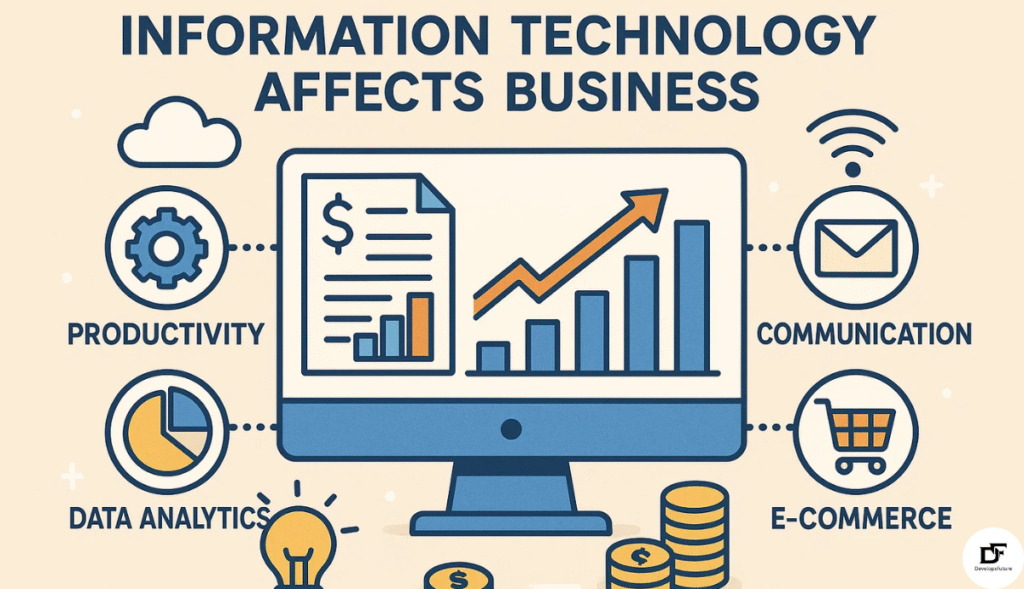In the modern world, businesses cannot operate successfully without embracing digital transformation. From small startups to multinational corporations. The question of how Information Technology affect business has become more important than ever. Understanding its impact helps organizations grow and innovate. It stays competitive in today’s global marketplace.
Information Technology affects business by providing tools and systems. That streamlines processes, analyzes data, and expands market opportunities. It transforms traditional business models, introducing faster communication. Also, stronger customer engagement and smarter decision-making. As a result, businesses operate more efficiently. They are delivering higher value to customers.
Today, Information Technology affect business through more than computers and the internet. It covers artificial intelligence, cloud computing, big data, and automation. As companies continue to digitize, the influence of IT will only increase. It is making the backbone of sustainable growth and innovation in commerce worldwide.
Table of Contents
What is Information Technology?
Information technology (IT) refers to the use of computers. Software, networks, and digital tools to process, store, and share information. Businesses rely on IT systems for communication, marketing, finance, and daily operations. Without these technologies, organizations would struggle to function in a fast-paced economy.
When analyzing how Information Technology Affect Business. We see that IT increases efficiency, reduces costs, and minimizes errors. It converts raw data into valuable insights, empowering leaders to make better decisions. In simple terms, IT is no longer optional. It is the foundation upon which modern businesses thrive.

What Technology Trends Are Impacting the Business World Right Now?
Emerging technology trends continue to reshape industries. Artificial intelligence, blockchain, and the Internet of Things (IoT) are some of the most powerful drivers of change. These innovations enable businesses to analyze vast datasets and automate processes. Also, improve customer interactions. For example, AI chatbots now manage millions of customer service queries. It significantly reduces the human workload.
Another major shift is the rise of hybrid work supported by collaboration platforms and cloud services. Cybersecurity advancements are also critical to counter rising threats. To fully understand how Information Technology Affect Business? It is essential to track these trends and adapt quickly. Failure to do so may result in lost opportunities and reduced competitiveness.
Enabling Data-Driven Decision Making
One of the most significant ways Information Technology Affect Business is through data-driven decision-making. With advanced analytics, organizations can evaluate real-time information and forecast trends. Also, make smarter strategic choices. This reduces risks and maximizes profitability. Especially in highly competitive industries.
Retailers, for instance, use predictive analytics to understand customer preferences and optimize inventory. Manufacturers rely on IT systems to predict supply chain disruptions and avoid costly delays. These examples show how Information Technology Affect Business by converting complex data into competitive advantages. That it fuels long-term success.

Enhancing Customer Experience
Customer expectations have risen dramatically. Information Technology Affect Business by helping organizations meet these demands. Chatbots, mobile apps, and AI-driven service platforms provide customers. With instant support and solutions. It is creating better experiences and saving time. Businesses that embrace such tools stand out in the market.
Personalization is another major outcome. E-commerce platforms suggest products based on browsing history, while banks offer customized financial services tailored to user needs. These practices highlight how Information Technology Affect Business by making customers feel valued, building trust, and improving brand loyalty for the future.
Expanding Market Reach and Opportunities
The global reach of IT is undeniable. Online platforms and e-commerce stores allow businesses to access international customers without needing a physical presence. This shows how Information Technology affect business by removing geographical barriers. And it is creating limitless opportunities for companies of all sizes.
Small businesses, freelancers, and large enterprises all benefit equally from this global exposure. Social media marketing, digital advertising, and online marketplaces help companies connect with new audiences. Clearly, Information Technology affect business by leveling the playing field. And expanding growth potential across industries.

Improving Business Efficiency and Productivity
Efficiency is at the heart of every successful business. Information Technology affect business by providing automation tools, cloud systems, and project management software. That reduces wasted time and resources. Teams collaborate faster, and workflows become more streamlined than ever before.
In addition, IT minimizes human errors in certain areas. Such as payroll, invoicing, and supply chain tracking. Automated systems ensure accuracy, save costs, and reduce manual intervention. Thus, Information Technology affect business by enabling organizations to focus more on innovation. And less repetitive manual work.
Effect and Role of Information Technology in Business Operations
Everyday operations depend heavily on IT systems. Email, video conferencing, and enterprise resource planning (ERP) are examples of how Information Technology affect business at the operational level. Without these systems, communication and logistics would be slow and inefficient, weakening overall competitiveness.
IT also plays a vital role in maintaining business continuity. Cybersecurity protections, cloud backups, and disaster recovery systems safeguard organizations against disruptions and data loss. In this way, Information Technology affect business not only by enabling efficiency. But also by ensuring resilience and sustainability.

The Role of Technology in the Company/Organization
Inside companies, Information Technology affect business by strengthening collaboration across teams. Platforms like Microsoft Teams, Slack, and Zoom make it possible. For employees worldwide to work together effectively. This improves productivity and accelerates decision-making within all departments.
Additionally, IT aligns organizational goals by connecting different departments. Finance, HR, and sales—into unified systems. Executives gain real-time insights into performance, ensuring strategic growth. Clearly, Information Technology affect business by integrating operations, breaking silos, and making organizations more agile and competitive.
Information Technologies in Marketing and Sales
Marketing and sales are areas where Information Technology Affect Business most visibly. Digital marketing strategies, SEO, and targeted advertising allow companies to reach specific demographics with precision, improving conversion rates and customer engagement.
Sales teams also benefit from Customer Relationship Management (CRM) software, which tracks leads, manages pipelines, and improves follow-ups. These tools demonstrate how Information Technology Affect Business by boosting revenue, building stronger customer relationships, and ensuring long-term brand success in crowded markets.
Challenges of Information Technology in Business
Despite its advantages, IT brings certain challenges. Cybersecurity risks, such as hacking and data breaches, threaten businesses of all sizes. This shows another dimension of how Information Technology Affect Business, creating vulnerabilities that require strong protection measures and ongoing vigilance.
Another challenge is the cost of continuous upgrades and employee training. Technology evolves rapidly, and keeping pace can be expensive. Resistance to change is also common, slowing adoption. However, these challenges further highlight how Information Technology Affect Business, as businesses must balance innovation with risk management to remain competitive.
FAQ’s
How does Information Technology Affect Business growth?
It accelerates growth by enabling global reach, streamlining operations, and providing tools for smarter decision-making, leading to higher profits.
How does Information Technology Affect Business customer service?
By offering instant responses through chatbots, mobile apps, and personalized services, IT ensures customers enjoy faster and more efficient experiences.
How does Information Technology Affect Business operations daily?
IT improves workflows, automates processes, enhances communication, and secures data, making operations smoother and more reliable each day.
What risks show how Information Technology Affect Business?
Cybersecurity threats, data loss, and high costs of upgrades are major risks. Businesses must address these challenges to remain competitive.
Can small businesses benefit from how Information Technology Affect Business?
Yes, IT levels the playing field by providing affordable cloud services, online marketing tools, and access to global customers.
Conclusion
The many ways Information Technology Affects Business cannot be overstated. From driving efficiency and improving customer experiences to expanding global markets. And enabling smarter decision-making, IT has transformed modern commerce across industries.
Of course, the benefits come with challenges, including cybersecurity threats and the financial burden of constant adaptation. Yet businesses that embrace IT. While preparing for risks, position themselves for success. Ultimately, Information Technology affects business by serving as both a growth engine. And a survival tool in today’s competitive digital age.




